Above: Ken Goldman. Jacob’s Ladder Triptych, 2015. Chromaluxe print after performance. Photos by Gideon Cohen
PEDAGOGY
Welcome to “Teaching with Film and Media,” a column in which our colleagues from different fields will share film choices and ideas about how to use them in the classroom. Curated by Olga Gershenson, each column engages with the theme of the current issue of AJS Perspectives.
Paradise
Transparent
The Marvelous Mrs. Maisel
When Comedy Went to School
(2020, dir. Asaf Saban, Israel, 32 min.)
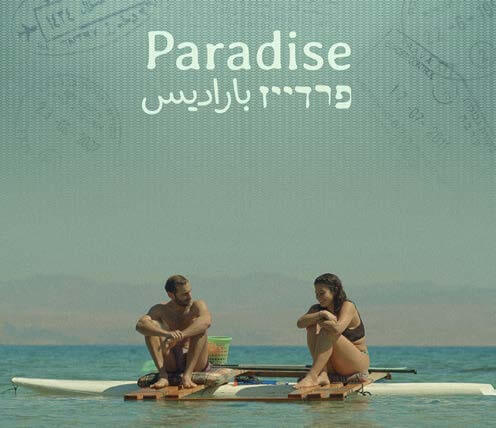
Detail from Paradise movie poster. Abra Filmhouse
After years of living in Berlin, Ali (Ala Dakka), a young Palestinian, lands in Israel for a home visit. It does not start well. Israeli authorities detain him at the airport only because he has an Arabic name. His traditional family does not welcome him either—they disapprove of his cosmopolitan lifestyle. Tired of navigating this difficult terrain, Ali escapes for a short vacation at a Sinai beach. But instead of finding peace and quiet, he runs into a group of Israeli Jewish tourists who mistake him for one of their own. At first, Ali goes with the flow, and passes for “Eli.” But when his real identity is revealed, the Israelis react with fear and prejudice. Ali fits neither with Israelis nor with Palestinians.
Paradise, cowritten by a Palestinian, Nayef Hammoud, and an Israeli, Asaf Saban, creates a nuanced portrayal of the Palestinian position in Israel. The story forces Ali (and us) to reflect on his identity that is always in between and is never fully accepted. The film explores these difficult ideas through compelling characters and an engaging narrative that feels authentic. Its short running time makes it ideal for classroom use
in courses dealing with Israeli society and the Israeli-Palestinian conflict.
For education sales contact Abra Filmhouse: abrafilmhouse@gmail.com.
(2017, season 4, episodes 6–10, created by Joey Soloway)
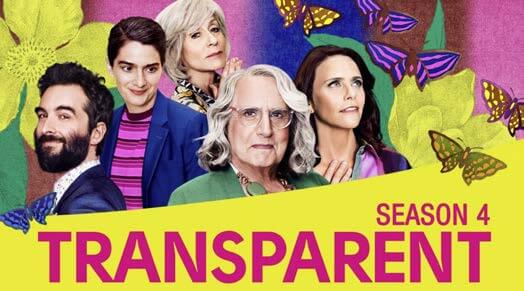
Transparent series poster. Amazon Studios
Intriguingly Jewish, with flawed, nuanced characters, high emotional stakes, and well-placed comic relief, Transparent is a gold mine for teachable moments on American Jewish identity. In season 4, we voyage with the Pfeffermans as they embark on a family trip to Israel. Followers of the show might know that due to BDS (boycott, divestment, and sanctions) concerns, the producers used B-roll footage for the Israeli scenes and shot the actual action on Los Angeles sound stages instead. Accordingly, the season ends up digging deep into the contemporary politics of Israel-Palestine, providing a brief primer on boycotts, West Bank settlement dynamics, Palestinian daily life, and progressive American solidarity, as well as unexpected spiritual journeys and Diaspora Jewish masculinity and gun culture, all to a driving Jesus Christ Superstar soundtrack.
Instructors may want to problematize certain depictions, such as the Bedouin tourist experience—is Soloway critiquing the Orientalism many would say is baked into these tourist excursions, or upholding it? Students will likely also welcome the opportunity to interpret the deliberately ambiguous revelation about the Palestinian goat farm: Was the place ransacked by Israeli forces? Or was the sensuous farm-to-table meal and attractive company a figment of Ali’s imagination and thus a fetishized creation of a well-meaning Diaspora Jew? With the politics of Israel-Palestine frequently a polarizing topic, this season has something for everyone: clear-headed messaging about the injustices of Palestinian daily lives combined with a well-placed, affectionate nod to the Israeli snack food Bamba.
Transparent is available to stream on Amazon Prime Video.
(2018, season 2, episode 4, “We're Going to the Catskills!,” dir. Daniel Palladino, USA, 53 min.)
(2013, dir. Mevlut Akkaya, Ron Frank, and Lawrence Richards, USA, 77 min.)
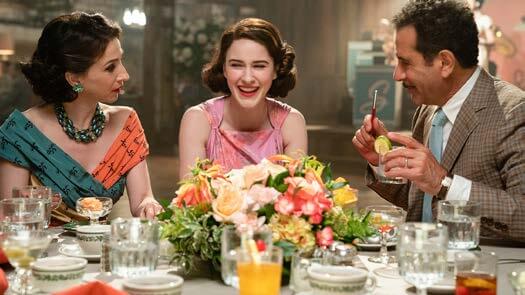
The Marvelous Mrs. Maisel publicity photo. Amazon Studios
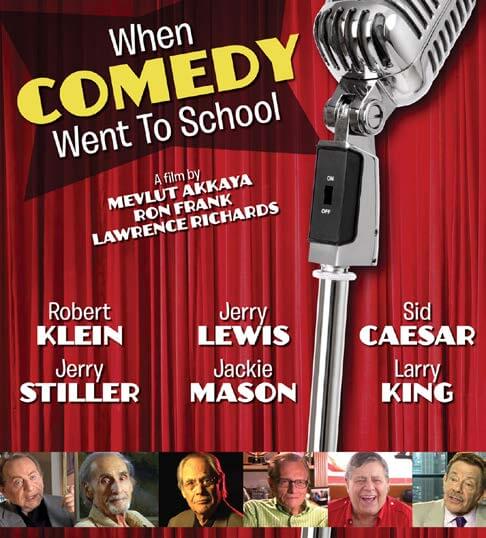
Detail from When Comedy Went to School poster. First Run Features
A pilgrimage to New York’s Catskill Mountains, a.k.a. the Borscht Belt, is at the center of an episode of the acclaimed series The Marvelous Mrs. Maisel and the documentary When Comedy Went to School. In the Maisel episode, Midge (Rachel Brosnahan), a budding comedian, arrives with her family for their annual vacation at a fictional resort, modeled on real-life iconic hotels such as Grossinger’s and Kutsher’s. These resorts were popular destinations for New York City Jews in the 1920s–1960s, where they found not only reprieve from the summer heat, but also entertainment in their own language, a vibrant social scene, and copious amounts of food. The Catskills had a profound influence on American Jewish culture, especially as a cradle of stand-up comedy, which originated from the nightly shows at the resorts. This is the story told in the documentary When Comedy Went to School. The Borscht Belt entertainment circuit helped launch the careers of many famous comedians, including Jerry Lewis, Sid Caesar, Jackie Mason, Mort Sahl, and Jerry Stiller, all of whom appear in the film, sharing hilarious personal experiences. It was a short trip from the city to the Catskills, but a giant cultural departure.
The series and the documentary can be used separately or together, in full or as film clips, in classes dealing with American Jewish experience and/or Jewish humor.
The Marvelous Mrs. Maisel is available for streaming on Amazon Prime Video. When Comedy Went to School is available on DVD on Amazon.
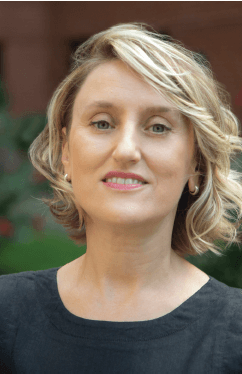
OLGA GERSHENSON is professor of Judaic and Near Eastern Studies, and of Film Studies at the University of Massachusetts Amherst. Her most recent book is The Phantom Holocaust: Soviet Cinema and Jewish Catastrophe (Rutgers University Press, 2013). She is currently working on a book about Israeli horror films.

Mira Sucharov is professor of Political Science and university chair of Teaching Innovation at Carleton University in Ottawa, Canada. Her most recent book is Borders and Belonging: A Memoir (Palgrave Macmillan, 2021).